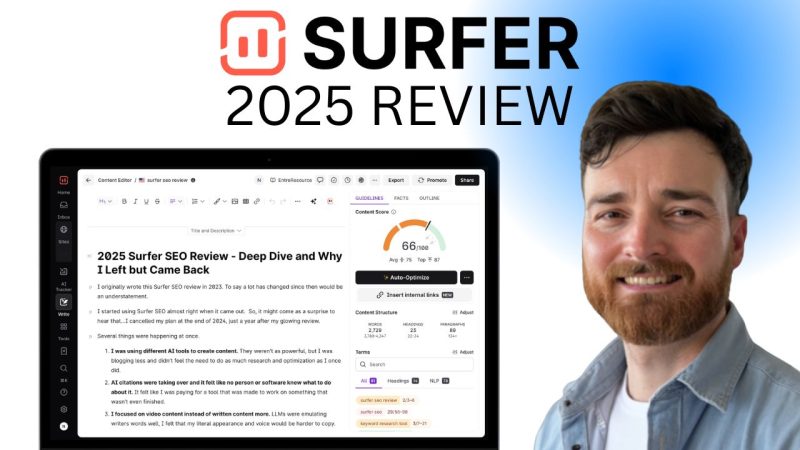
overall
Surfer SEO Review TL:DR
Surfer SEO remains one of the best on-page content optimization tools available—especially if you’re creating blog posts meant to rank. It connects with live SERPs and Google Search Console, gives real-time recommendations for content structure and keyword usage, and helps turn AI-assisted writing into something search-engine and human-friendly. On the flip side, it doesn’t replace full-blown keyword research suites, editing existing content (especially with drag-and-drop builders) can be friction-filled, and the pricing is higher than some bloggers expect.
Pros
Cons
Quality
Accuracy
Cost
Support
I originally wrote this Surfer SEO review in 2023. To say a lot has changed since then would be an understatement.

I started using Surfer SEO almost right when it came out. So, it might come as a surprise to hear that...I cancelled my plan at the end of 2024, just a year after my glowing review.
Several things were happening at once.
- I was using different AI tools to create content. They weren't as powerful, but I was blogging less and didn't feel the need to do as much research and optimization as I once did.
- AI citations were taking over and it felt like no person or software knew what to do about it. It felt like I was paying for a tool that was made to work on something that wasn't even finished.
- I focused on video content instead of written content more. LLMs were emulating writers words well, I felt that my literal appearance and voice would be harder to copy.
But as of this month, I'm back baby.
I am on the Surfer SEO enterprise plan and using it daily again..
Here's why I still believe that Surfer SEO is worth it and how I'm using it now.
If you have any remaining interest in playing riding this SEO roller coaster with me, keep reading.
Why AI Couldn't Kill Surfer SEO
AI does a lot of things really well. SEO is something it does "just ok," and I've learned the hard way that that isn't good enough.
Surfer goes far beyond just quickly spitting out something that can pass as an article.
Here are the biggest benefits of Surfer compared to the existing big name AI softwares most of us are already paying for anyway.
#1 Integrations (WordPress Plugin + GSC)
The more personalized your need, the less useful AI becomes as the sole solution. Surfer SEO leverages real time SERPs (search engine result pages) and connects to your websites Google Search Console insights.
This gives you suggestions that are well beyond the cookie cutter ChatGPT ones.
Further, it lets you publish directly to your site thanks to the WordPress plugin. This simply isn't feasible yet with ChatGPT or similar tools.
Can you do it? Sure...If you're a polymath SEO AND AI expert who is willing to build your own system and you don't mind that it probably won't be as effective and might actually cost you more in the long run.
#2 AI Humanizer
Search engines need fresh content. It can smell regurgitated food and it doesn't like it. It's still debatable how search engines detect and address "ai generated" content, but it's wise to avoid publishing blatant AI slop at scale.
Surfer helps you create content that actually serves the search engines things they value. Things that are more likely to get you placed in AI citations.
#3 Data
LLMs know words, but they don't know search engines or the substance of what is already ranking. At least not in a way that really moves the needle forward. Surfer does.
#4 Specialization That Takes Content to the Next Level
It takes 20 seconds to get a "blog post" written. We all know though that if it isn't going to rank, it doesn't matter how long it took.
Surfer offers functionality that allows us to create content that gets beyond the AI slop phase where nothing good happens.
Let's talk about these features in more detail.
Overview of the Surfer SEO Interface
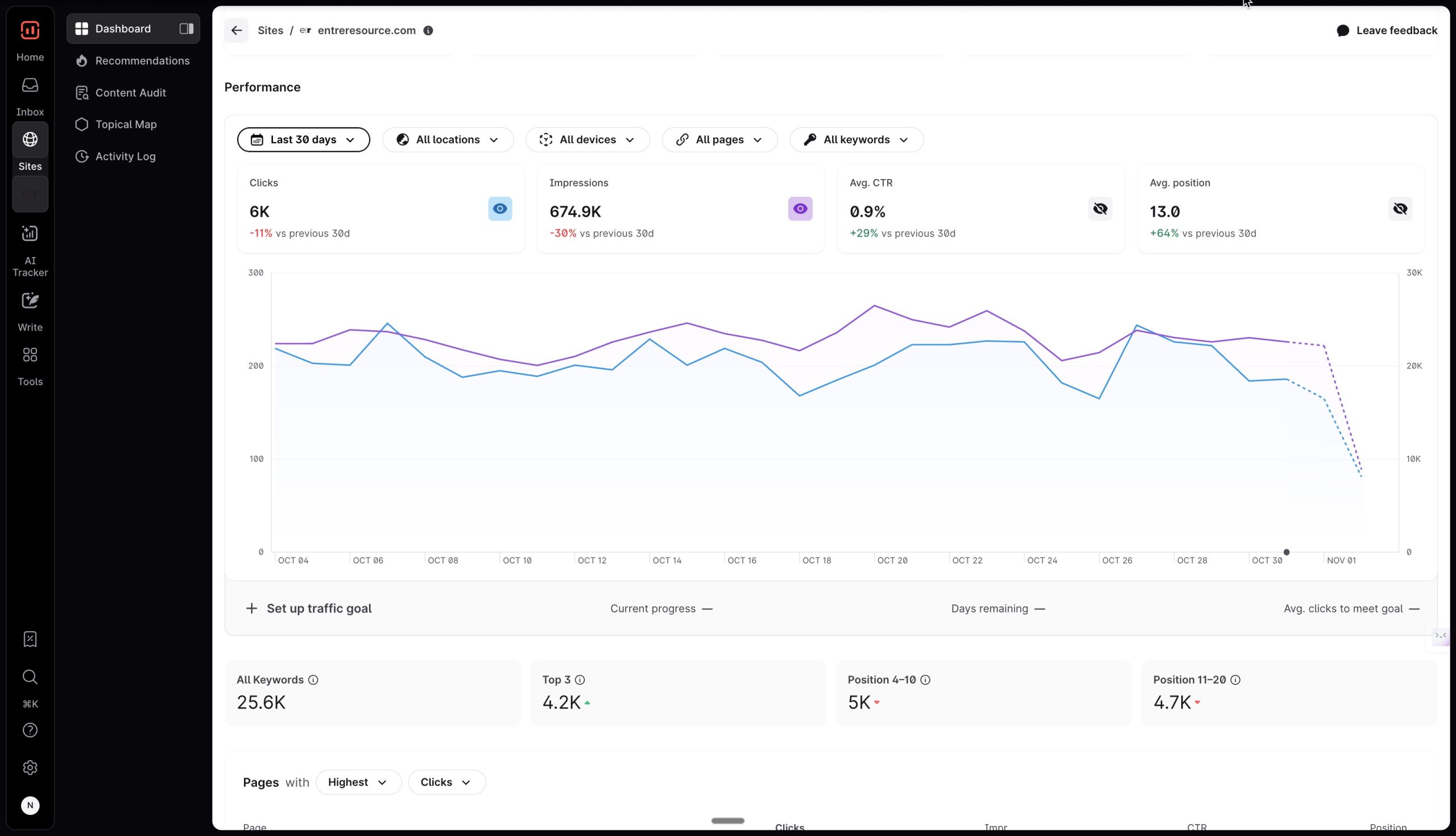
Here is what Surfer SEO can do for us in a nutshell.
- Optimize existing blog posts to break through plateaus and climb SERPs.
- Compose content that has a fighting chance of not just showing up in the search engine rankings, but doing it quickly and holding that position for a long time without updating.
- Perform keyword research and find new blog post topics and keyword "clusters" to write about going forward.
- Analyzing what Google is rewarding in SERPs so we can emulate it for faster results.
There are core tools inside of Surfer SEO.
- Content Editor - Compose new content or optimize old content for search engines.
- Keyword Research - Hunt and gather new, high potential keyword opportunities.
- Audit - Identify opportunities to improve a specific URL.
- Recommendations - Get regular suggestions on things you can do to your articles to protect or gain more traffic.
- SERP Analyzer - See the content scores for other URLs on search engine results pages.
- *New* AI Tracker - Monitor your brand for AI citations and placements.
- Rank Tracker - Monitor specific terms that are important to you. I don't pay for this because I already do this with AHREFs.
I will admit, it's a little bit confusing at first to understand the differences and how to use each tool. Don't worry though. I spent the time figuring it out, so you don't have to!
Let's dive into each feature in a bit more detail.
Surfer SEO Content Editor
The foundation of Surfer SEO is the content editor. This is where we write our blog posts and leverage Surfer's suggestions to make sure they have a fighting chance of ranking in SERPs and getting AI citations.
The content editor lets us write the articles ourselves our use Surfer AI which will help write them for us.

These can get pricey and the siren's call of using ChatGPT or Claude to write your post and then just uploading it into Surfer and optimizing it will be loud.
The choice is yours, I prefer to use a mixture of my own writing and AI help.
Do NOT blindly publish Surfer AI generated content. It is better than ChatGPT, but the best articles are still customized and have your real world experiences and insights integrated into them.
We can either start from scratch or import existing content to optimize it.
I actually ran this post you're reading through the content editor. Here's what it looked like when I started.
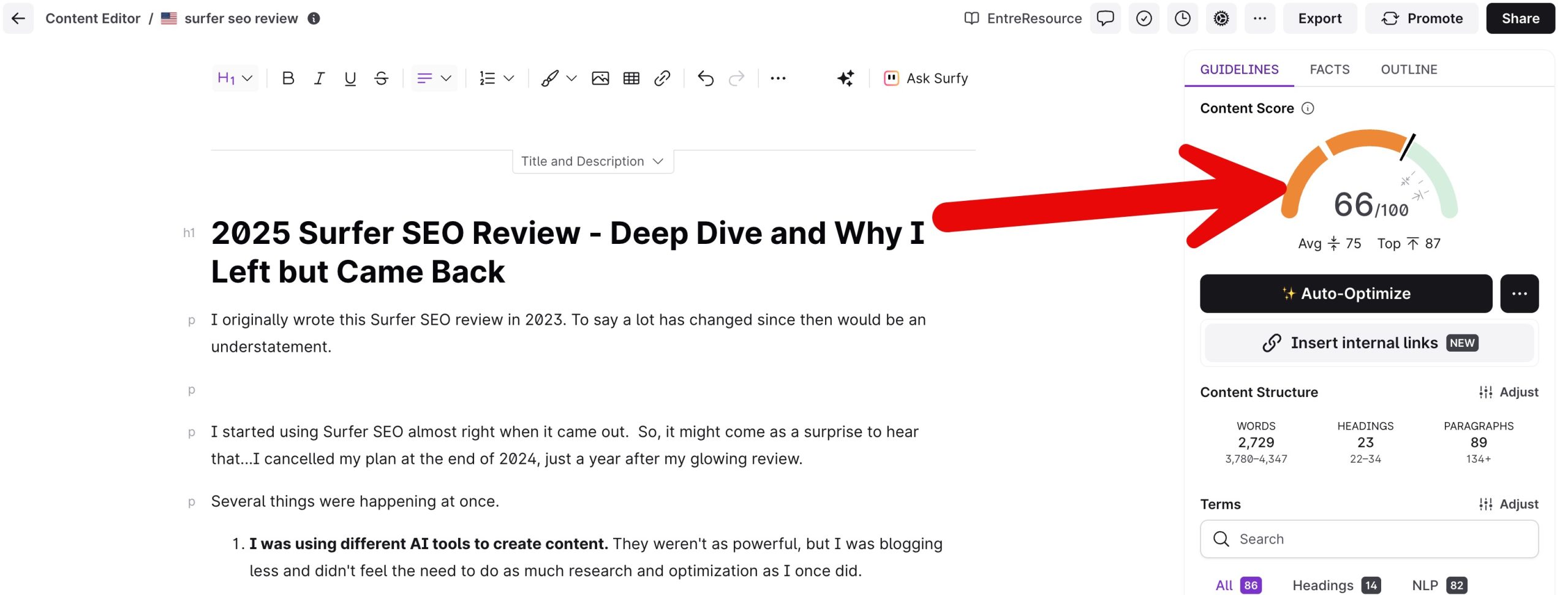
I rarely compose a post outside of WordPress and Thrive Architect, but the process is still the same.
Think of this area as where the words and structure are developed. WordPress will be where you will paste the content you've created and then add media elements, styling, and anything else that you typically do before publishing.
To get started with the content editor, we enter the keyword or keywords that we want to target for our post.
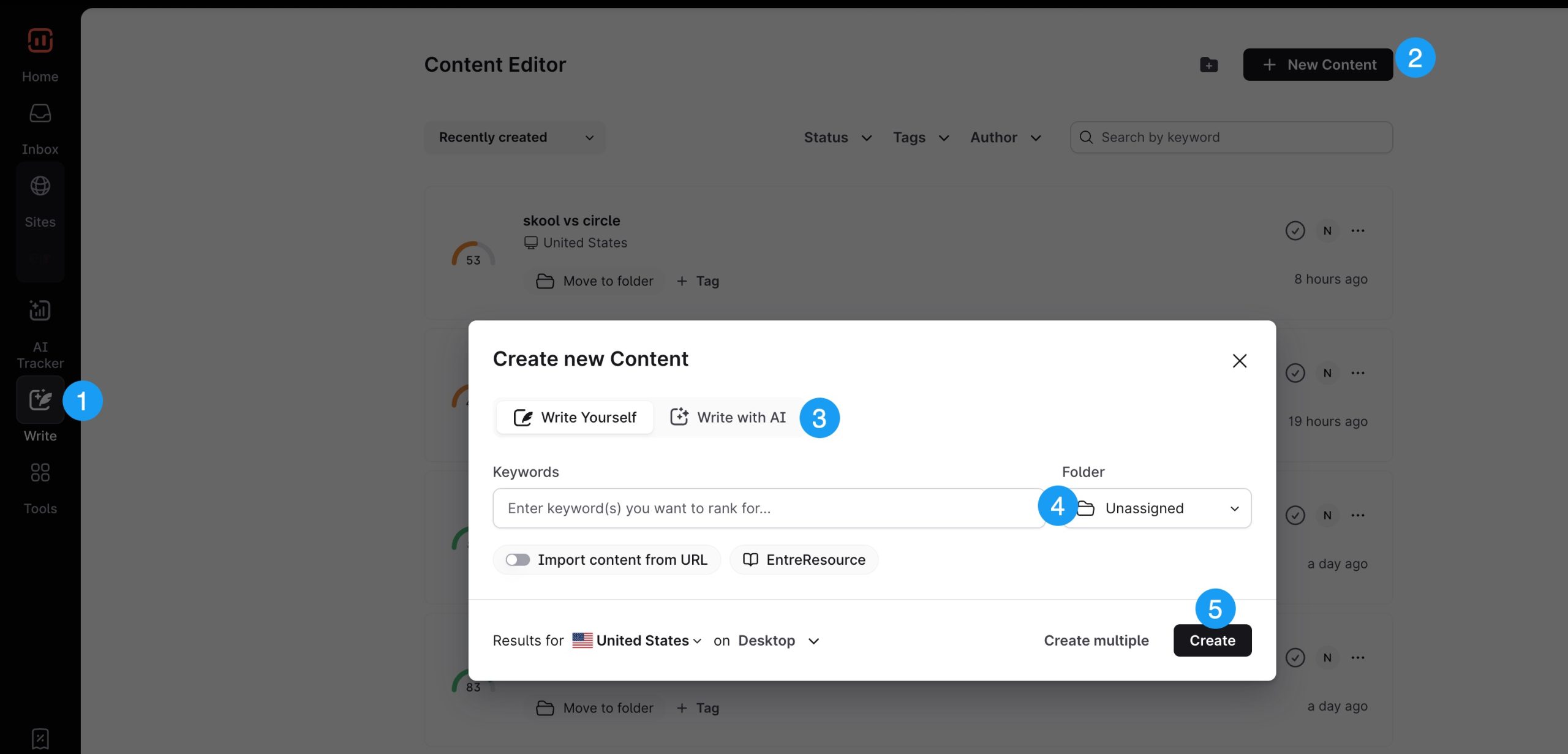
From there, it will analyze the search terms and prepare a plan of attack for us that is based around what Google is rewarding for articles on that topic.
Essentially, it reverse engineers the top pages in SERPs and then gives us a checklist of things to include along with suggestions of exactly how to use them. It also provides suggestions for how to structure the post and what to include as our headers. It suggests the range of words we should aim for, how many images we should add, and much more.
I can do things like select which blog posts I want to consider as competitors and which I don't. This helps ensure I don't optimize for things that don't have the same reader intent.
This is a perfect example, by the way, of something basic AI LLMs like ChatGPT simply can't do yet.

The image above shows us how many words, headings, paragraphs, and images to aim for based on what the other top ranking pages are doing in search results.
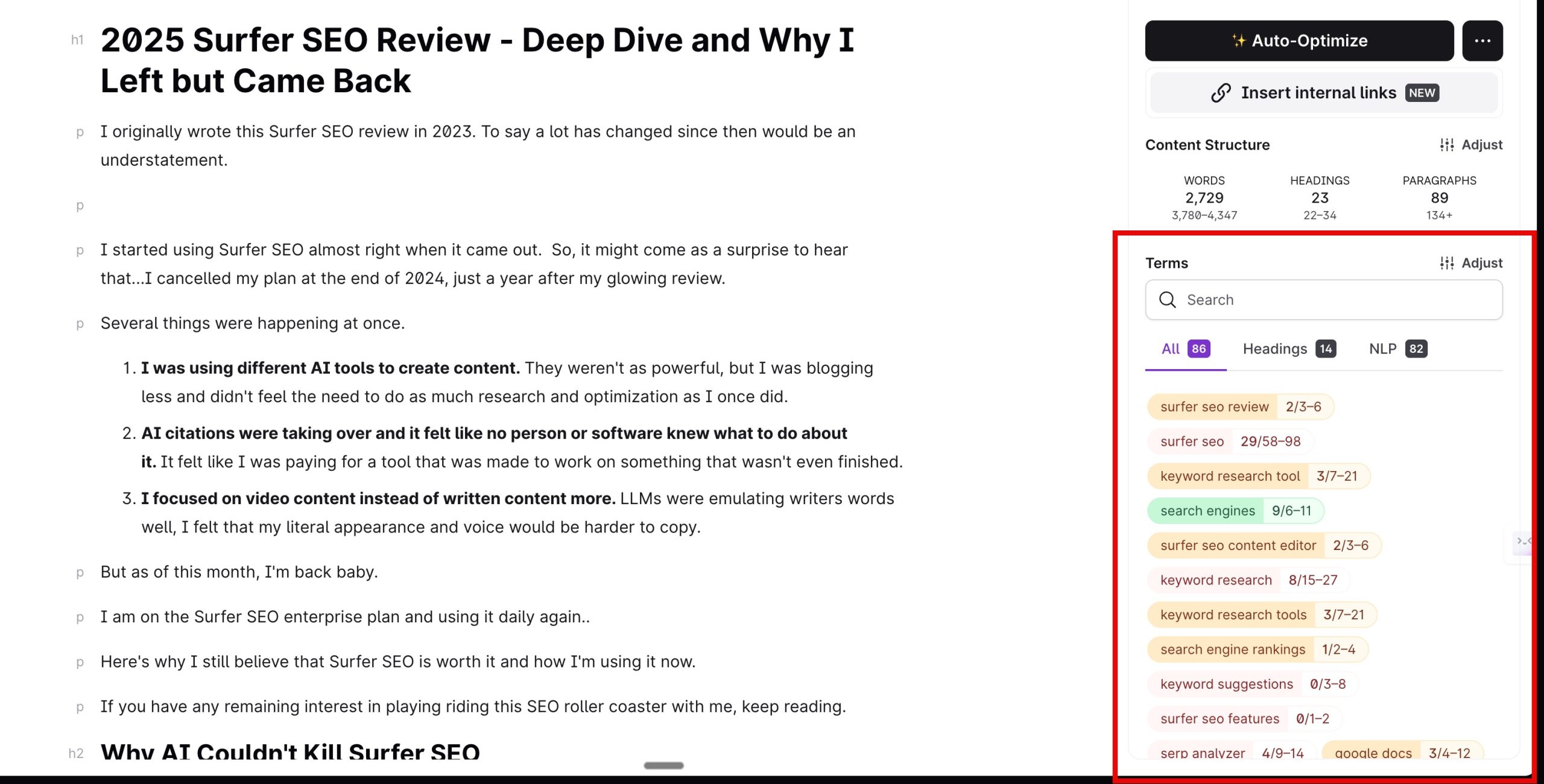
The most amazing part of the content editor to me is how it shows not just which words we should include, but it also suggests exactly how many we should aim for.
It will tell us if we're stuffing keywords or if our content is lacking terms that our competitors are using. This is just one of the many reasons why I like Surfer as a content optimization tool, it actually helps you create relevant and useful content.
What's the point of keyword research, afterall, if we aren't showing search engines and AI that our article is targeting them?
We get a blank space to compose the content similar to a basic Google Doc. As we write content, the score goes up (or down) in real time.
It's wildly gratifying to watch it go up...
We can also get insight into what people are asking around the topic, so we can answer those and create higher value pieces.
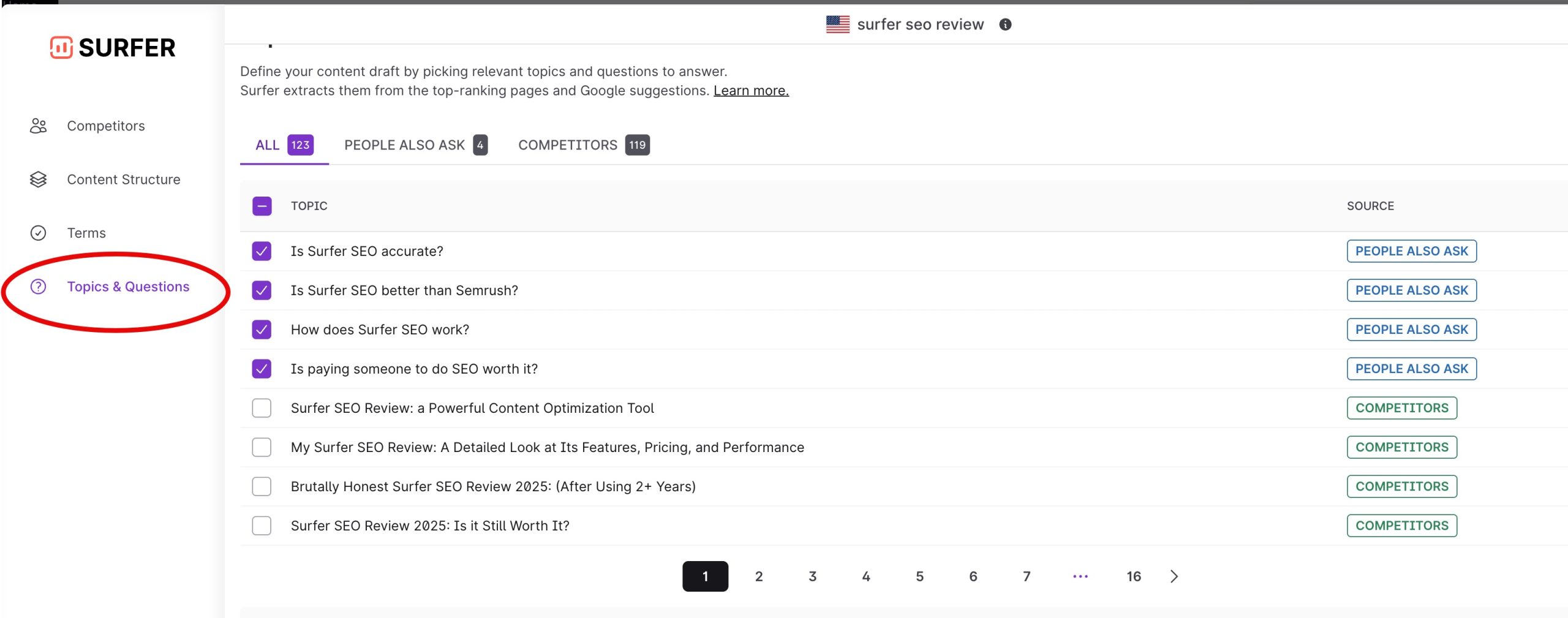
Surfer SEO Content Audit
This part confused me at first, but here's what you need to know.
The Surfer SEO Audit tool lets us analyze the performance of our existing pages.
We can analyze URLs one by one or you can audit your entire website at one time.
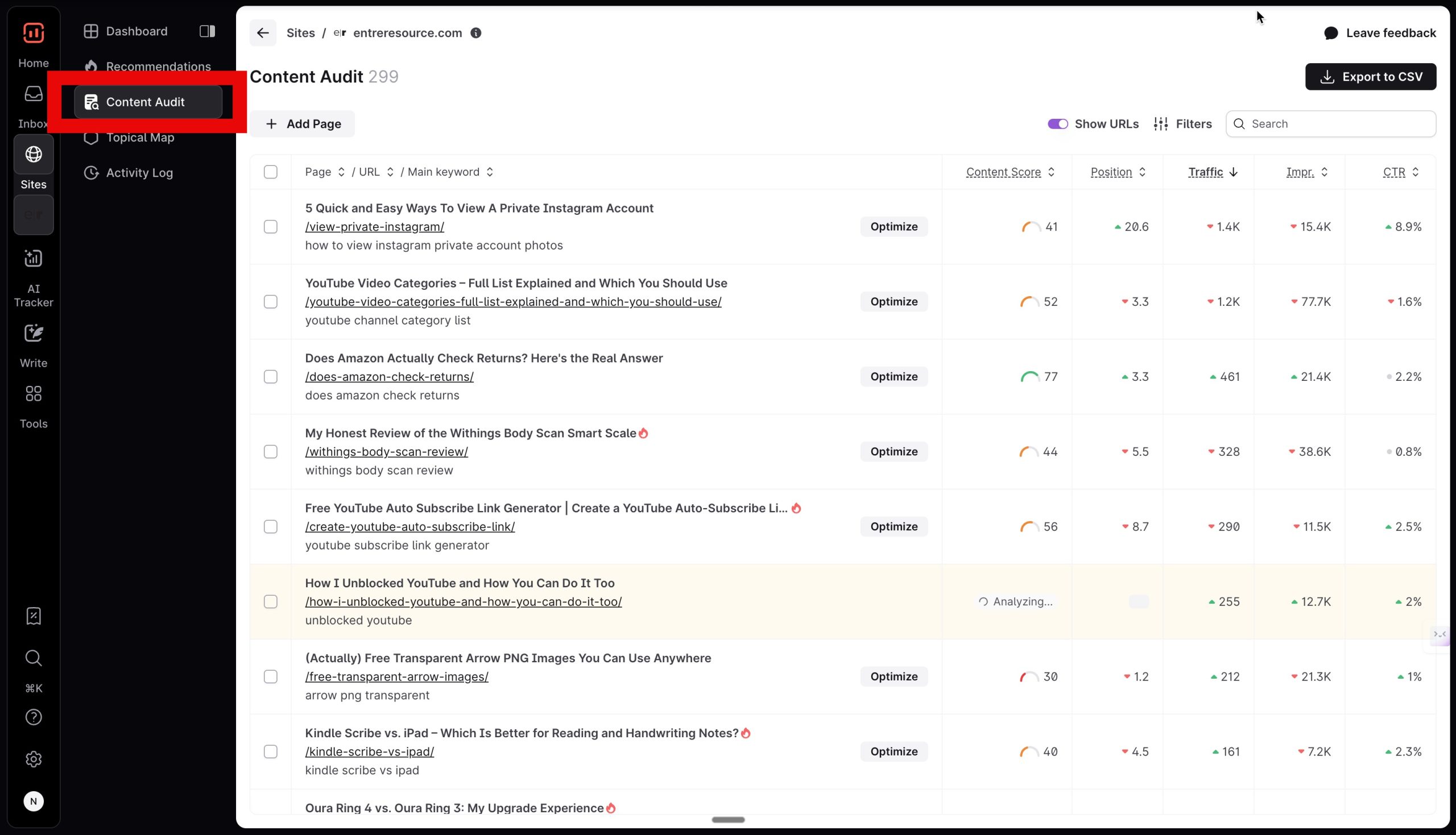
In the example above, I can filter my existing blog posts and see which ones have the highest or lowest content scores. I can optimize accordingly.
If you want to audit a single page, you paste the URL and type the keywords you want to optimize the article for and then run the audit.
This requires that we connect to our Google Search Console. Some people may not love that, but for me, I enjoy knowing that they are using search console data because it's perfectly accurate, unlike some of the other SEO tools I've used.
This is just scratching the surface of what this feature can do, but for the sake of keeping this post reasonably concise, I'm going to leave that for another day.
Surfer SEO Recommendations

With the domain planner, we can paste either keywords or URLs (from domains we have connected to Surfer with GSC) into the search, and we'll get tons of helpful insights.
The results page will look different for domains and keyword searches. Domain searches show you more opportunities for "quick wins" with existing content, while keyword content planner searches work more toward giving you new ideas.
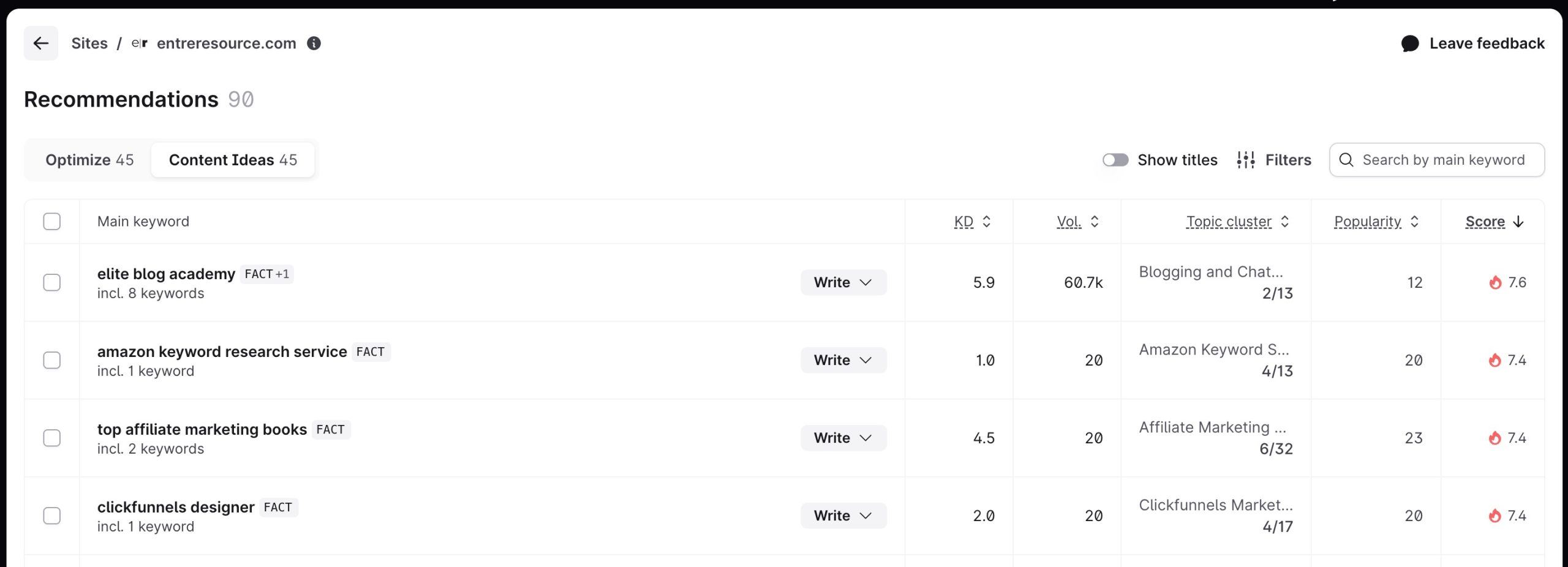
We also get recommendations for content topics. This isn't my favorite feature, since some recommendations seem to be silly, but I have found a few great ones in here.
Surfer SEO SERP Analyzer
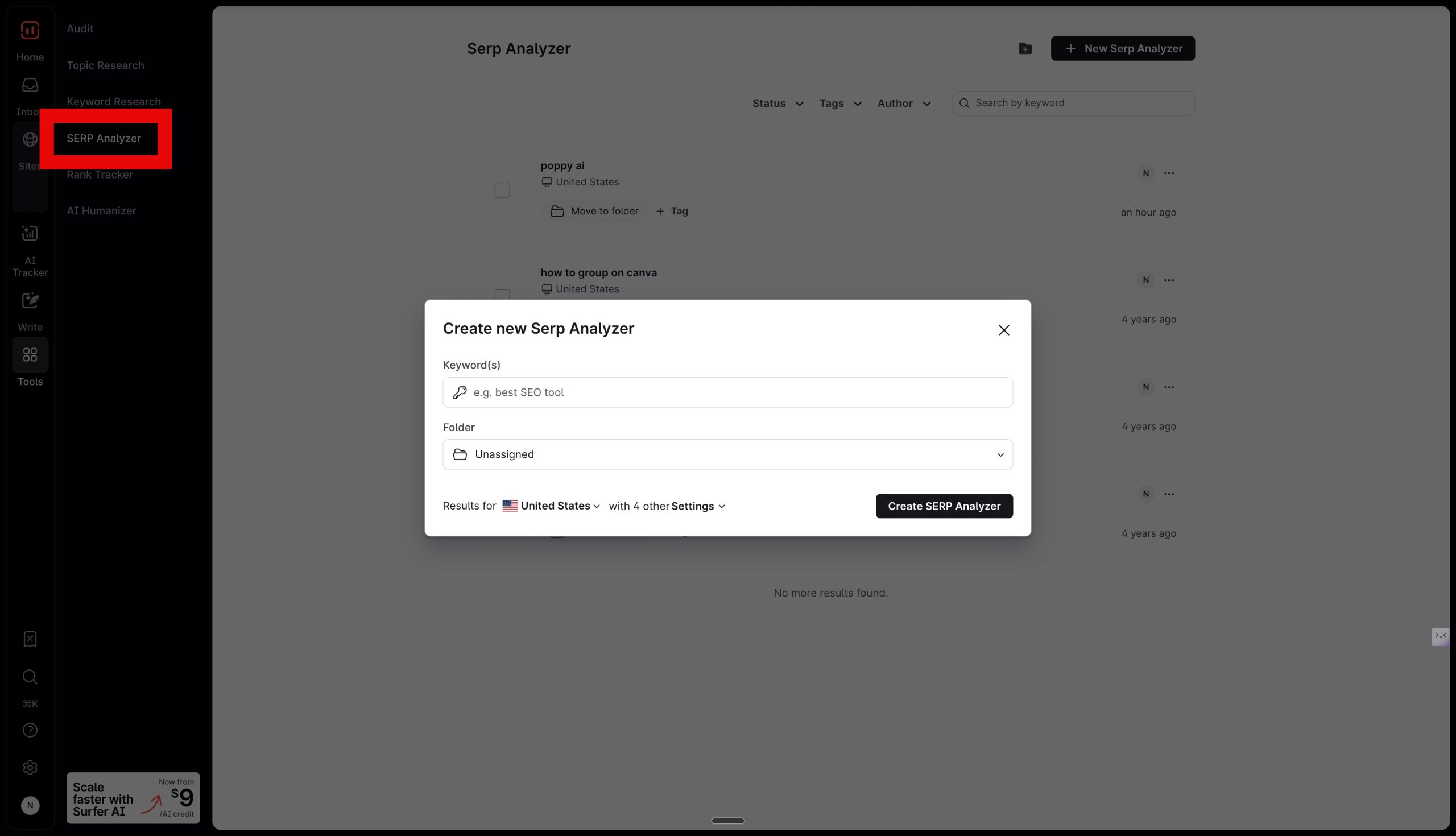
The SERP Analyzer lets us see the commonalities of blog posts that are ranking in search engines.
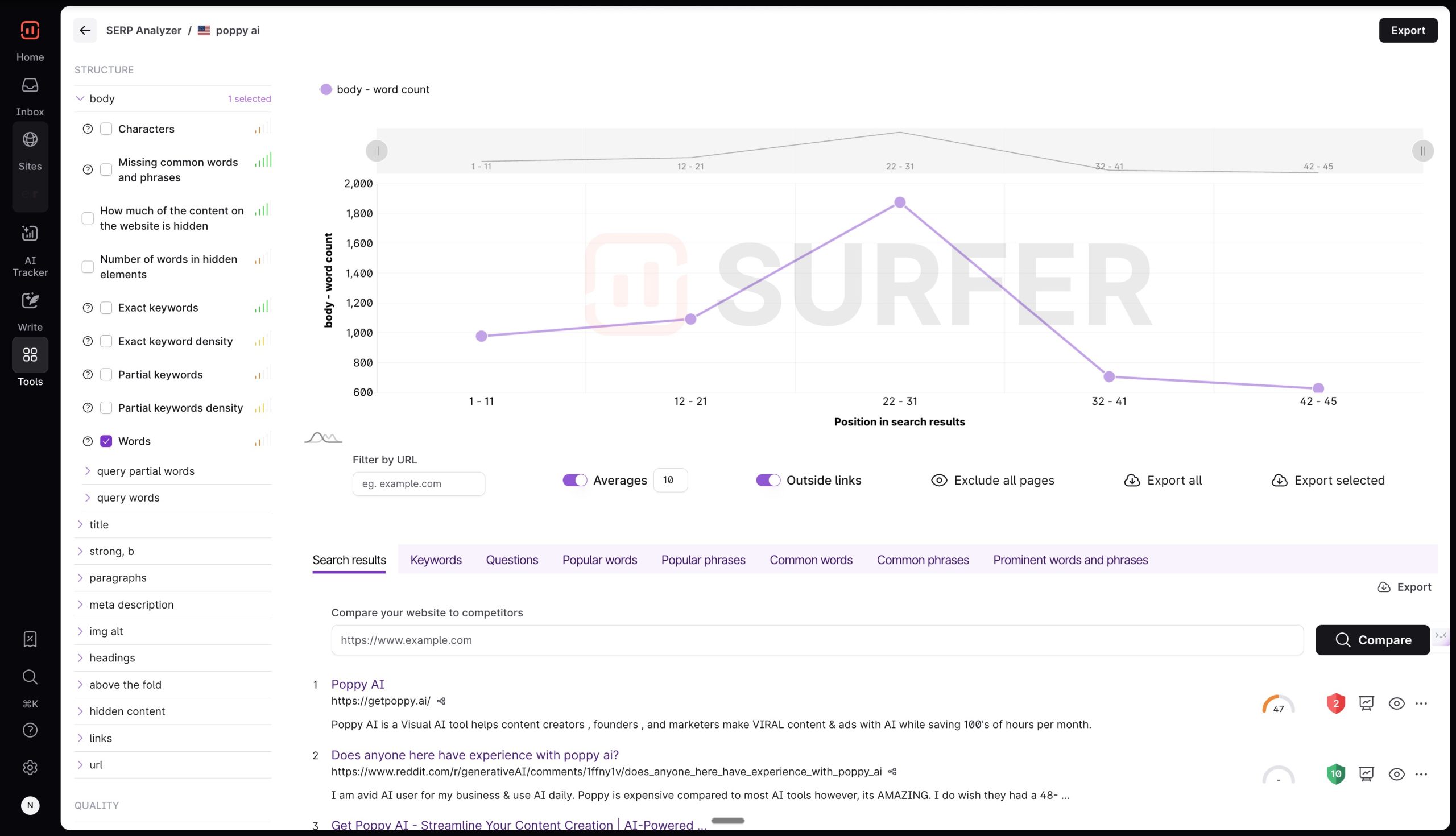
We have a tremendous amount of data that we can play around with. The general purpose though is to find out what the top pages are doing when it comes to specific keywords. We can then use these insights in our own content.
I don't use this feature quite as much because most of these insights are put directly into the content editor by default anyway.
Surfer SEO Keyword Research
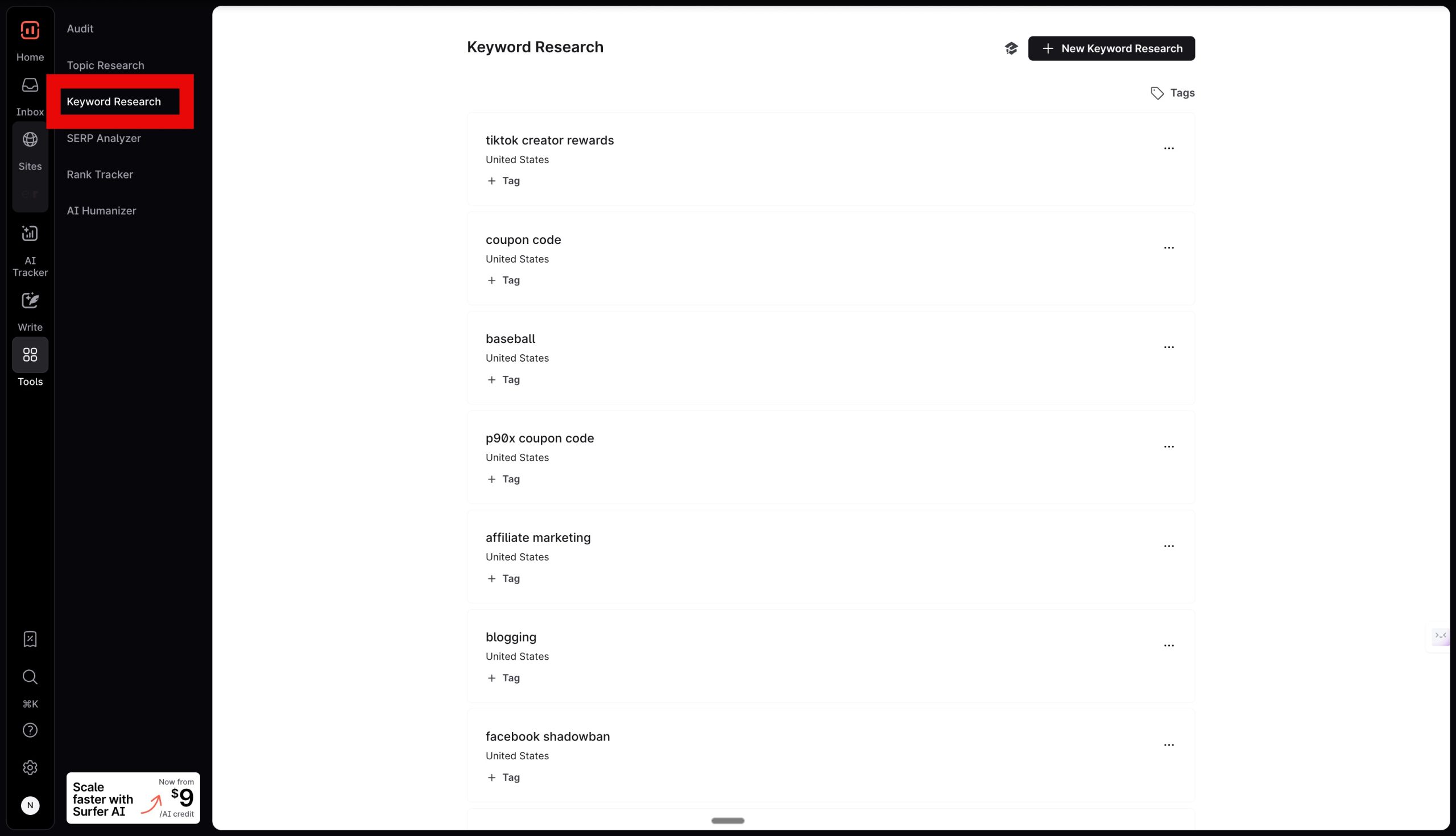
Last but not least, we have the keyword research feature of Surfer.
This tool is relatively straightforward but is also unique compared to the more well-known keyword research tools like AHREFs.
It allows us to hunt and gather new keyword ideas and it provides keyword suggestions.
It makes it easier for us to decide what is worth targeting by showing us keyword difficulty scores and relevance scores.
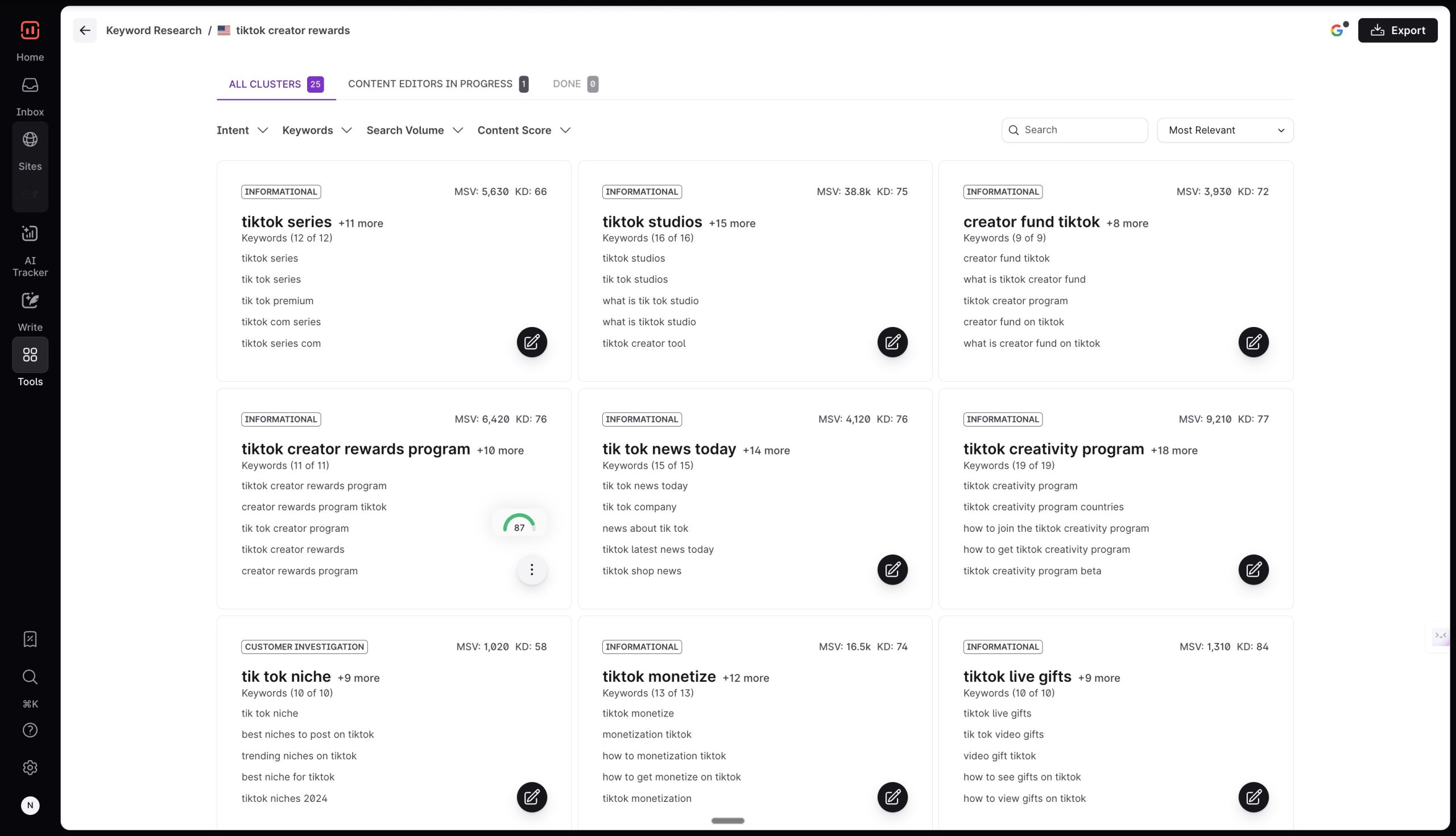
We can see important things like the search volume for a specific keyword and the SERP similarity of similar terms to the core term we typed in.
We can export this data or copy it to a clipboard.
This might be enough for some users, but I prefer to do the majority of my keyword research in AHREFs. It's not necessarily "better" but I prefer the interface better.
Surfer SEO AI Tracker and Rank Tracker
I know that AI is all the rage, but I only track my specific brand terms. You can do much more than that, but I do that with other tools.
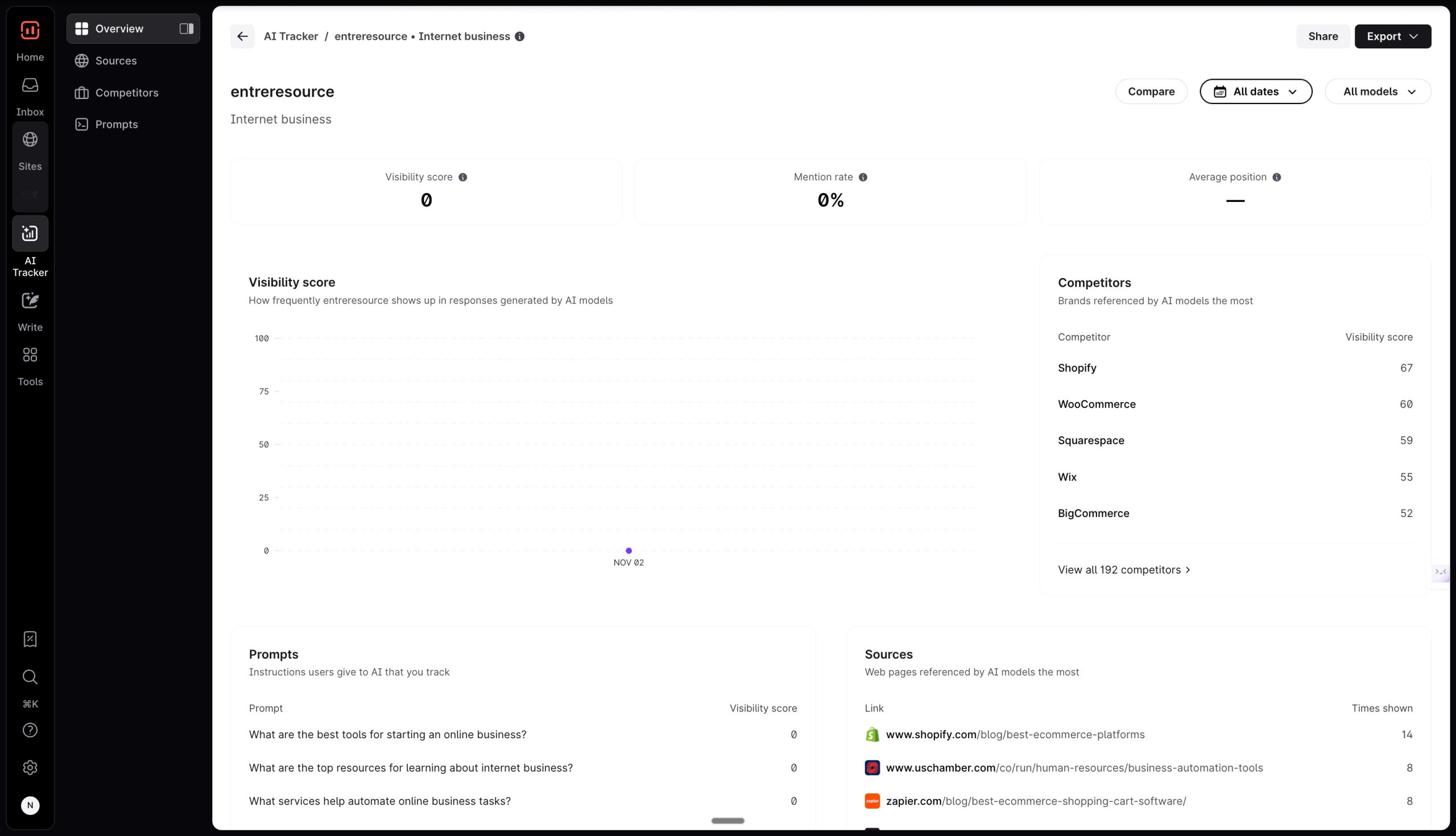
Unfortunately, AI monitoring seems to be expensive everywhere. I'm hoping that changes, but if you're hoping Surfer can give you tons of details on your AI citations, you'll be disapointed. Every tool (AHREFs and SEMRush included) are the same. The charge so much that it doesn't really make sense for most people to bother.
The rank tracker is cool as well, but I do that with AHREFs so I don't pay for it in Surfer. It would be redundant. If I didn't have AHREFs also, I'd certainly enjoy this.
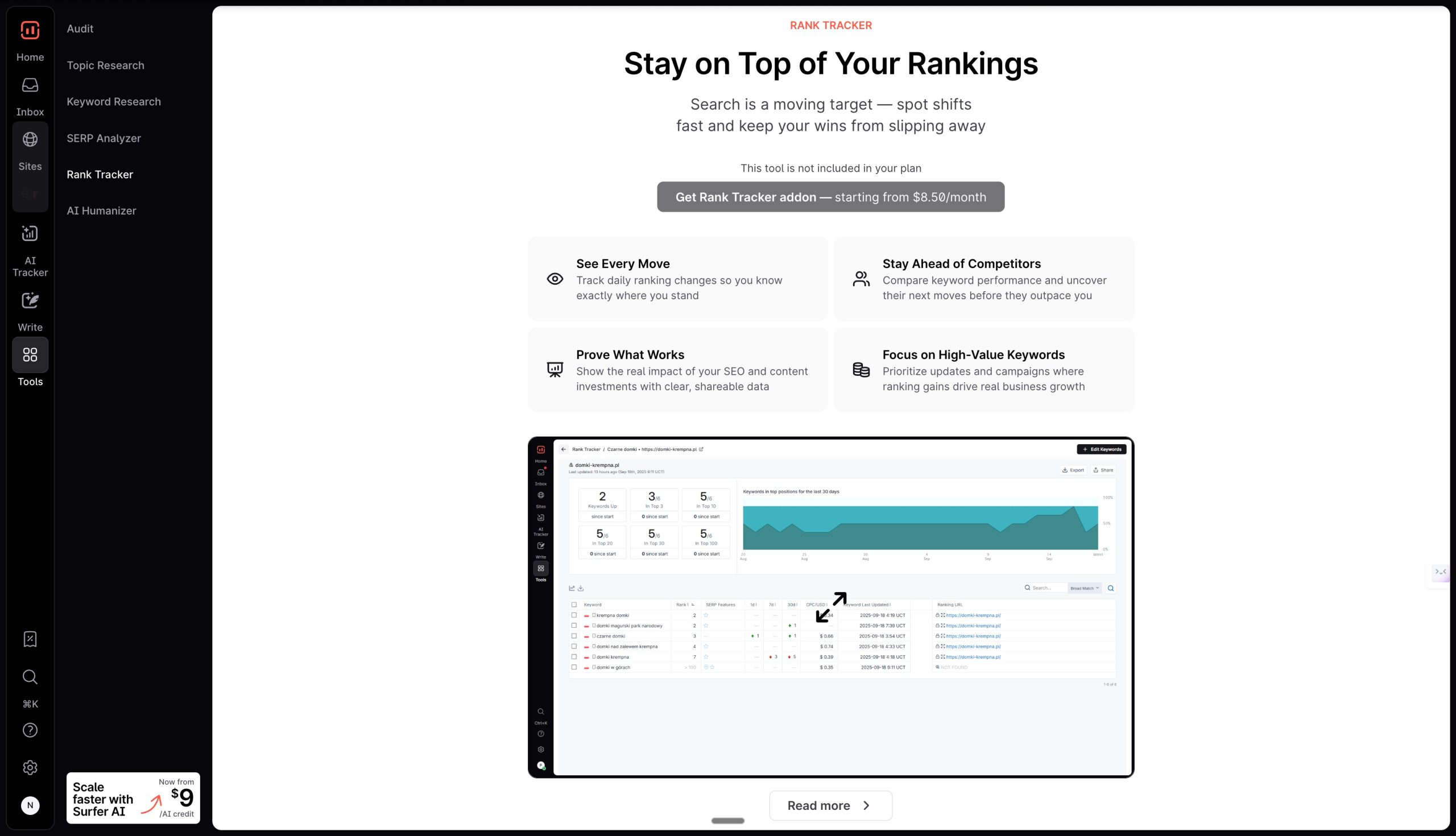
Surfer SEO Issues
The issues I have with Surfer aren't enough to keep me from using it of course, but here are some of my headaches (not all were in their control).
Issue #1 Editing Existing Content Is a Pain
If you use a robust content editor tool like Elementor or Thrive Architect, you know that updating content is not as simple as copying and pasting some HTML back and forth.
I'm crossing my fingers that they create a WordPress plugin soon that makes the process easier.
Issue #2 Not a Perfect Replacement for Other Keyword Research Tools (Yet)
You can get a lot of keyword research done with Surfer SEO, but tools like AHREFs and SEMRush will still be a part of my SEO arsenal for the foreseeable future.
The biggest value of Surfer for me is what it does with on-page optimization, and the keyword research features are just a nice bonus. I use them, but I wouldn't pay for them on their own.
Issue #3 Not Perfectly Accurate
No SEO tools are. Surfer, however, is in the top tier of accuracy in the industry. Just know no SEO tool, even Surfer, is going to give you perfect data, estimates and metrics.
Surfer SEO Pros
Here are the things that separated Surfer from other on-page optimization tools on the market.
Favorite Thing #1 It Shows You Not Just What to Add But Also What to Remove
Other on-page optimization tools I've used have focused entirely on what to add to an article. Yes, Surfer shows you what to add, BUT it also shows you how many to add. This means that it will tell you if you're stuffing keywords.
This is literally the "anti-keyword-stuffing solution" vs. a tool that enables it.
This is amazing because we're often told to blindly chase content length at all costs. "More is more," is what most bloggers have adopted, but that isn't always the case.
Ironically, the "more is more" approach often leads to worse results. Oooof! Think about that: you might actually hurt your content by working "harder" on it and grinding out sentence after sentence.
Favorite Thing #2 Writes for Google AND Humans Better Than Any Alternative I've Found
My biggest concern was that my new content would read like a robot wrote it.
As I've touched on already, tools like ChatGPT for example, are great when used as starting points, but I don't believe in letting them have free rein over content. Much of what they produce will be totally nonsensical or just awkward.
When these tools for automatically creating content are used, I think about half of the content needs updated to sound natural.
You can tell who is outsourcing their content to robots entirely, and it's very gross to read.
I take pride in my writing and don't plan on giving way to the robots soon. Surfer SEO makes it so that I can leverage AI with accurate context.
It is incredible to find the user intent behind topics as well, so you won't force keywords that aren't related to your topic (assuming that you use the proper keywords for your content editor topic creation).
Favorite Thing #3 Kills Writer's Block
Surfer SEO makes writing feel like a game. It takes most of the guesswork out.
I don't believe it sped up my content creation though.
I had to find ways to optimize my score without sounding robotic, and it often made me realize my content needed to be longer than I had planned. Sometimes I'd be writing about a topic and realize that ranking that article, I needed to actually educate myself on a few other related points that should be included.
For example, I wrote a post on how to find the original publication date of a website, and I only knew how to do 3 of the 5 ways that most articles mentioned, so I had to go learn those things to make my content as complete as theirs.
Surfer SEO Pricing
The pricing of Surfer SEO has changed since I first joined.
Here is the Surfer SEO cost back in 2023...

Here is the up to date pricing.

They now have just 3 tiers and only 2 are really in the budget for most bloggers.
| Essential | Scale BEST VALUE | Enterprise |
|---|---|---|
|
Essential
$79 SAVE $240
per month, billed annually
For individuals and small teams starting to grow their organic visibility. Choose EssentialIncludes
|
Scale
$175 SAVE $528
per month, billed annually
For growing teams ready to accelerate visibility and publish at scale. Choose ScaleEverything in Essential, plus (up to 5× higher limits) and:
|
Enterprise
from $999
per month, billed annually
For agencies and brands with high volume, compliance, or complex needs. Contact SalesEverything in Scale, plus:
|
Unfortunately, there is no Surfer SEO free trial or coupon code, but they do have a very generous 30 day money back guarantee.
Surfer SEO Alternatives
There are several other tools that work similarly to Surfer SEO. Like I said, I've used a lot of them. There are literally too many keyword research tools to list here, and I don't recommend Surfer SEO as an all-in-one keyword research solution, so I'm going to focus on other on-page SEO (on-page optimization) software alternatives to Surfer SEO.
What do you think about Surfer? Let me know in the comments!
Start Ranking Content Fast
7 Day Money Back Guarantee with All Surfer Plans

